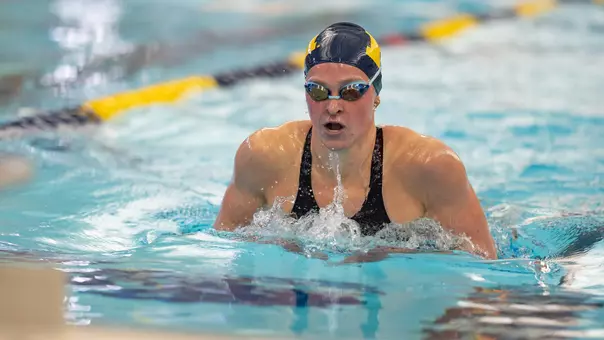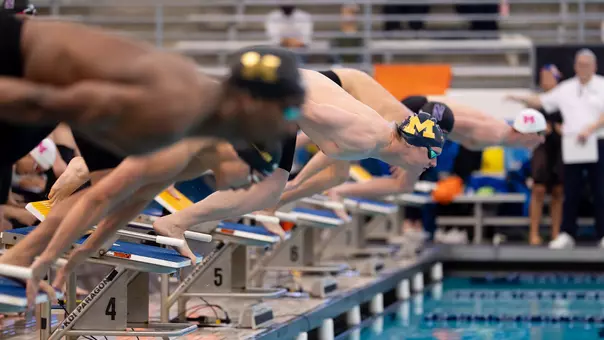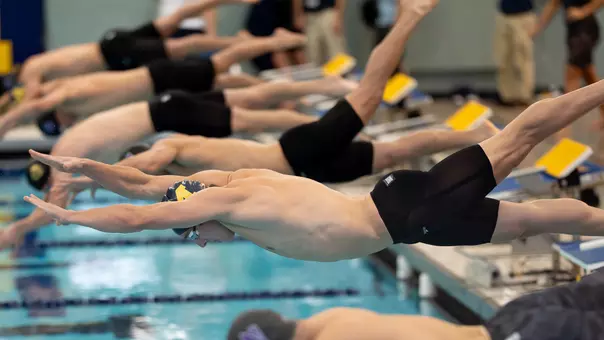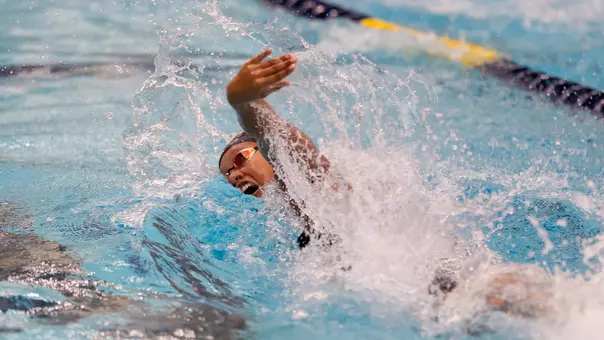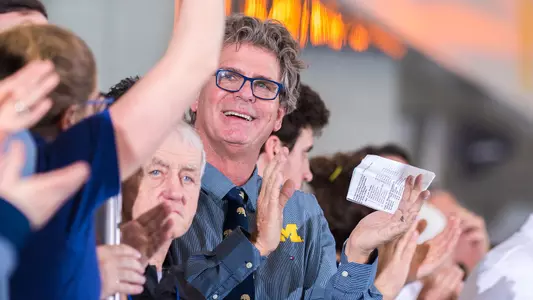
Kornacki: Bottom's Story of Gold
7/19/2016 12:00:00 AM | Men's Swimming & Diving, Women's Swimming & Diving, Features, Olympics
By Steve Kornacki
ANN ARBOR, Mich. -- Mike Bottom got his gold medal at the White House instead of the victory podium at the Moscow Olympics, and the man putting it around his neck wasn't an official. It was President Jimmy Carter, whose decision to boycott the 1980 Olympics because the Soviet Union had invaded Afghanistan cost Bottom his chance at an Olympic gold medal that summer.
"I have a gold medal that is actually rarer than an Olympic gold medal," said Bottom, the University of Michigan's men's and women's swimming and diving head coach. "It was an Olympic gold medal that was rewarded by an act of Congress. That was in recognition of being on the Olympic team and not getting to get one.
"President Carter was going to do as much as he could to avoid the political fallout, which there wasn't a whole lot of. But the farmers (there also was a Carter-mandated grain embargo to the U.S.S.R.) and the Olympians that year were the sacrificial lambs to try to keep Russia from expanding. But it didn't work."
It wasn't until nine years later that the Soviets withdrew troops from Afghanistan, which it invaded Dec. 24, 1979. Carter announced the Olympic boycott on March 21, 1980 -- one month and one day after his deadline for the Soviets to pull out had been ignored. Sixty-four nations joined the U.S. in boycotting the Moscow Games, and the Soviets retaliated by boycotting the Los Angeles Olympics of 1984.
Other Americans who had excellent shots at gold medals in 1980 and never participated in an Olympics were basketball's Isiah Thomas (who won two NBA championships with the Detroit Pistons), gymnast Kurt Thomas, wrestler Lee Kemp, boxer Bernard Taylor and 200-meter butterfly swimmer Craig Beardsley.
Athletes were used as pawns in a boycott standoff that brought little or no change. However, Bottom did get that gold medal as gesture from the President and Congress to recognize the top U.S. athletes who lost their opportunity to compete for gold.
"It's actually worth more than an Olympic gold medal because there are fewer of them," said Bottom. "They brought us to the White House, and I think I have a photo of it. Jimmy Carter gave it to us, and it was nice. He just kind of shook your hand and put it around your neck. You don't realize what you've got until it's gone, though, and my Olympic opportunity was gone.
"I had a choice. I could get bitter, like a lot of Olympians who got bitter at that point did. Or I could do something about it, and I decided my goal was to coach and put as many people on Olympic teams as I possibly can.
-- Mike Bottom
"Coaching is my Olympic experience, and it continues to go on. What do I get out of the Olympics? It's just life for me, and it's been my life and one of the reasons I came here. I mean, Michigan probably has the greatest tradition of Olympians going into the Olympics in swimming."
The University of Michigan's Bentley Library lists 71 swimmers and 20 divers who went from the Wolverines to the Olympics through the 2012 London Olympics.
Bottom will be coaching at his sixth Olympic Games next month in Rio de Janeiro, Brazil, keeping the streak he began in the 1996 Atlanta Olympics alive and teaching. He'll also be there as an official member of the U.S. team for the first time.
"I've been dreaming about this since I was 10 years old," said Bottom, who will assist Team USA head coach Bob Bowman, who preceded Bottom as Michigan's coach and currently is the head coach at Arizona State. "This is my Olympic dream. I'm ready to do whatever it takes to help the U.S. be successful in Rio. I can't wait to get started."
He will finally get to walk with the U.S. team in the opening ceremonies that he wasn't allowed to attend 36 years ago in Moscow.
"My first experience with the Olympics was in 1980," said Bottom. "I was selected for the U.S. team and was going to be swimming in the 100-meter butterfly. I was unable to go because of the boycott.
"They sent us to Hawaii, where they had an alternate Games, and I swam against a whole lot of guys from a lot of different places. But it wasn't the Olympics. I won, and my time was faster than what won at the Olympics."
The gold medal in the 100 butterfly at Moscow went to Sweden's Par Arvidsson with a time of 54.92 seconds.
While Bottom didn't win the gold medal he wanted most, he was determined not to let being left out define him. Coaching provided an avenue to the Olympics, and he's mentored both Wolverines and swimmers from other colleges and countries to quite a medal haul.
From the 1996 through 2004 Olympiads, nine of the 18 medals awarded in the 50- and 100-meter freestyle events were won by Bottom-coached swimmers. Gary Hall Jr., his greatest protégé, won five gold, three silver and two bronze medals in the 1996, 2000 and 2004 Olympics.
"The passion I have for people on Olympic teams stems from 1980," said Bottom. "Then I went to the Olympic trials in 1984 and got fifth -- so I missed making the U.S. team (again). That was the year I realized making the Olympic team was not going to happen.
"I continued to swim and became one of the first professional swimmers, and I did other things while I was swimming. But I was always swimming during my lunch hour."
Bottom spent the decade after 1980 in the business sector, working as a systems analyst for Pacific Bell and as an internal controls analyst for a company in San Francisco. He began coaching as an assistant to Auburn coach David Marsh in 1991 and became an assistant in 1994 at Southern Cal, his alma mater, where he was a world-record holder on the 400-meter freestyle relay, a five-time All-American and a member of three NCAA champion teams (1975-77).

1976 NCAA 400 Medley Relay Champions (from left): John Naber, Bob Shearin, Mike Bottom, Joe Bottom
Joe Bottom, his older brother and Trojans teammate, won a silver medal in the 100-meter butterfly at the 1976 Olympics in Montreal, and Mike figured his day was coming as an Olympian.
And it was, only as a coach.
Mike Bottom coached more than 50 Olympic swimmers before joining the coaching staff of the 2016 U.S. team, which includes two of his former Wolverines in Connor Jaeger, winner of the 400- and 1,500-meter freestyle Olympic trials finals, and Sean Ryan in the 10-kilometer open-water swim.
Bottom served as co-head coach at Cal (1997-2007) before coming to Michigan, which attracted him with its Olympic heritage.
When asked how that international blend of swimmers impacts the Michigan program, he said, "What we're about at Michigan is excellence. We're about being the leaders and the best. The leaders and the best strive to go to the highest level, and in swimming that's the Olympics. It's not the NCAAs -- it's the Olympics. Is the NCAA the key meet for the University of Michigan? Yes. Is the Big Ten one of the key meets for Michigan? Yes. And those are all stepping stones to being the best.
"What keeping our eyes on those Olympic rings does is keep our eyes moving forward even through an NCAA championship (which he won with the Michigan men in 2013). No one quits after the NCAA Championships and takes two weeks off. Why? Because after that there is the thought of world championships, international meets, the Olympic Games."
This will be the sixth Olympiad he's coached at.
"The Olympic experience for me has been as full as it possibly can be," said Bottom.
1980 BOYCOTT IMPACT ON WOLVERINES: According to the archives at the Bentley Library, the U.S. boycott of the Moscow Games deprived six Wolverines of their chance for Olympic medals. Divers Barb Weinstein, Chris Seufert and Kevin Machemer had won spots on the U.S. squad coached by Michigan diving coach Dick Kimball. Mark Johnson had made the wrestling team. Mark Gorski and Tom Schuler qualified for the cycling team. Gorski returned to win a gold medal in the 1,000-meter sprint in the 1984 Olympics in Los Angeles. Schuler was an alternate on the 1976 and 1984 Olympic teams. Ann Arbor native Carl Schueler took up race walking at Frostburg State College in Maryland. He won the 50-kilometer race at the 1980 U.S. Olympic trials. After not competing in Moscow, Scheuler enrolled in the regional and urban planning program at the Michigan School of Natural Resources. He went on to make three more U.S. Olympic teams.

